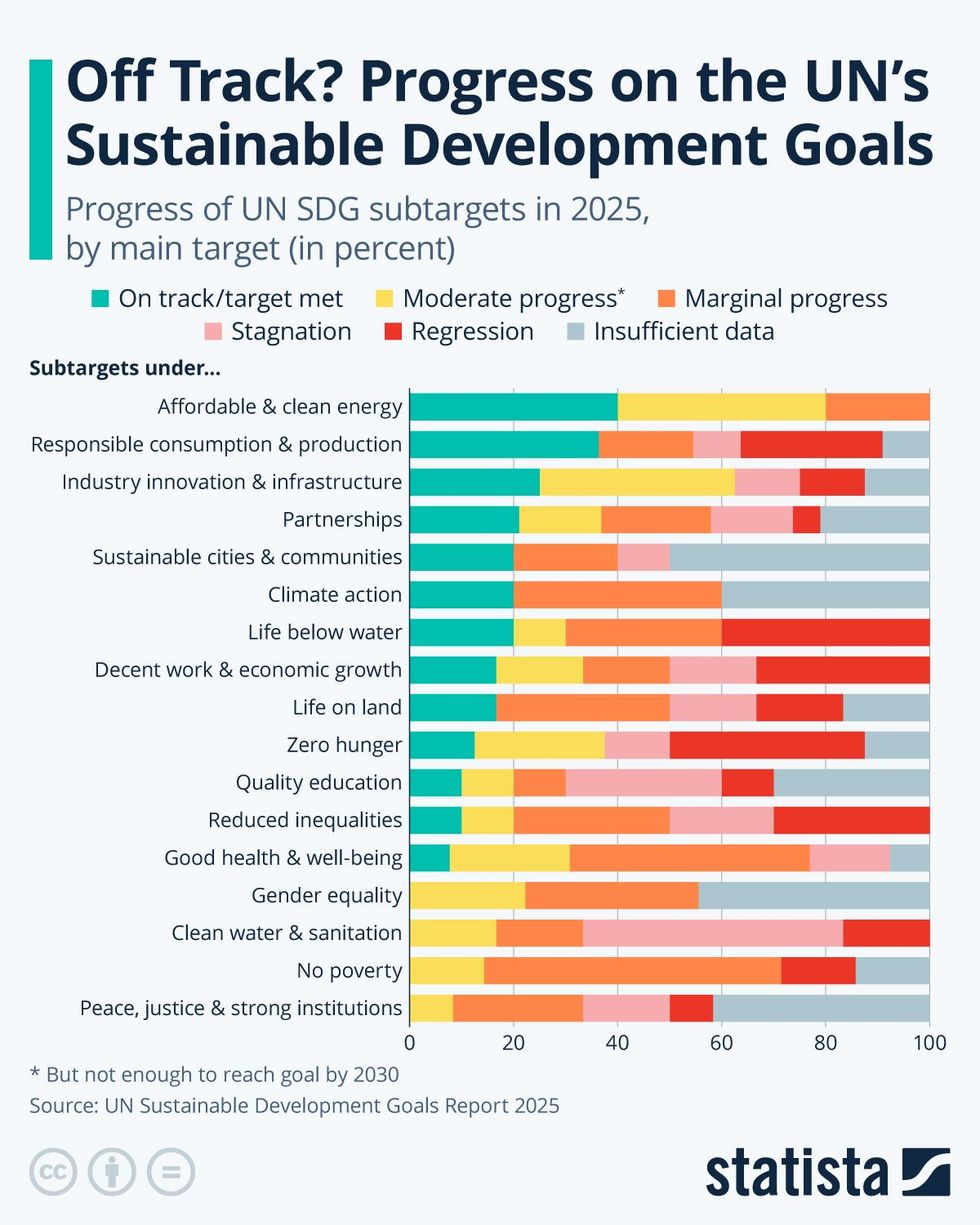The 2025 UN World Social Report revealed a "global social crisis" characterized by insecurity, inequality, crumbling social cohesion, and diminishing trust.
Recognizing this mammoth task, the Second World Summit for Social Development (WSSD2) is a vital opportunity to assess the biggest challenges; identify omissions; and recommit to inclusivity, equity, social protection, and sustainability. The event is organized by the United Nations Department of Economic and Social Affairs (DESA), which will collaborate with various stakeholders to facilitate the crucial discussions. WSSD2 will attract over 8,000 participants.
This WSSD2, let's strengthen global partnerships, implement effective policies, foster international cooperation, set concrete proposals, and make it another historic leap for social development.
As UN Secretary-General António Guterres said, "True development is not about prosperity for the few. It is about opportunities for the many, grounded in social justice, full employment, and human dignity.”
The WSSD2 takes place during the same month as the COP30 climate conference. Both summits share the common goals of creating a more just and sustainable world for everyone. Climate change threatens the foundations of our lives; without concrete action, our efforts to enhance social protections are futile. Progress in education, poverty reduction, and social justice will be undermined if we cannot bring global warming under control.
WSSD2: Three Decades in the Making
The first summit brought together 186 countries and was a landmark moment in global efforts to address critical social challenges, including poverty, unemployment, public health, and social exclusion.
Its ambitious agenda concluded with the adoption of the Copenhagen Declaration and Programme of Action, which outlined several targets and initiatives, and became a foundation for future policies worldwide. Although the summit was, at the time, a historic moment for global progress, many of the hopes and expectations of the declaration were not realised.
More than 30 years have passed since the first summit. A lack of urgency and budget has left the WSSD2 long overdue, as the United Nations' attention has been diverted to Climate and Biodiversity summits (COP Conferences), of which there have been many.
This summit is an essential part of the United Nations' work in an area that has been overlooked for too long. Organized by civil society organisations, the World Social Forum is the only other event which addresses the planet's social needs and alternative visions of globalization.
As UN General Assembly President Annalena Baerbock said, "Without social justice there will never be long-lasting peace and security."
 (Photo by Statista/CC BY-ND 4.0)
(Photo by Statista/CC BY-ND 4.0)
This year's summit will be co-facilitated by Philippe Kridelka, Belgium's permanent representative to the UN, and Omar Hilale, Morocco's permanent representative. With mounting global tensions and spiraling humanitarian crises worldwide, this conference must go beyond other United Nations summits.
The Doha Political Declaration, which was negotiated well in advance of the summit, does not contain any new or binding indicators, nor obligations for monitoring. This lack of concrete measures and quantifiable goals leaves implementation simply to the goodwill of nations. As we have seen with various climate and biodiversity goals, this does not work.
Even before the summit, the effectiveness of the WSSD2 has drawn sharp criticism from hundreds of NGOs, who have labelled the pre-negotiated declaration insufficient.
Increasing militarization, decreasing effectiveness of multilateralism, widening inequalities, the potential for future pandemics, and a right-wing shift in many influential nations have led to the redirection of vital resources away from our planet's most pressing societal needs.
Instead of ensuring the well-being, safety, and prospects of society, money is siphoned into the production of weapons of mass destruction, nuclear programs, military bases, and the promotion and justification of wars around the world.
The State of the Planet: WSSD2 Key Priorities
The WSSD2 will focus on the weakest performing Sustainable Development Goals.
No Poverty: Over 2.8 billion people, more than one-third of the world's population, live in extreme poverty. Since the last summit, 35% of the people who exited poverty have relapsed back into it.
Zero Hunger: Rates of hunger and food insecurity have increased alarmingly since 2015. Two billion people worldwide lack regular access to safe, nutritious, and sufficient food. In 2024, 23% of children had stunted growth, and 6% of those under the age of 5 were affected by wasting.
Gender Equality: If the 2023 rate of progress remains, it would take an estimated 300 years to end child marriage, 286 years to remove discriminatory laws, 140 years for women to be represented equally in workplace leadership roles, and 47 years for equal representation in national politics.
Clean Water and Sanitation: In 2024, 2.2 billion people lacked access to safe drinking water, 3.4 billion people lacked safely managed sanitation, and 1.7 billion people did not have basic hygiene services at home.
Affordable and Clean Energy: In 2024, 645 million people lacked access to electricity. Almost 2 billion people are still using polluting fuels for cooking, exposing them to severe health risks.
Decent Work and Economic Growth: Informal employment remains stubbornly at an estimated 2 billion people, accounting for 58% of the world's employed population. Approximately 65% of the world's population lives in countries where income inequality is widening. There are still 160 million children involved in child labor.
Climate Action: The year 2024 was confirmed as the hottest year ever on record. A recent report by the UN revealed that current policies put the planet on track to reach a catastrophic 3.1°C warming by 2100. This scenario would expose 600 million people to flooding, reduce food yields by half, cause severe water shortages, lead to insurmountable habitat and biodiversity loss, create month-long brutal heatwaves and wildfires, heighten the risks of insect-borne diseases, and profoundly deepen inequalities.
Life Below Water: In 2019, 35% of global fish stocks were overfished. An estimated 5-12 million metric tons of plastic enters the ocean each year, costing the global economy $19 billion every single year. Record-breaking global coral bleaching began in 2023, affecting 84% of global reefs across more than 80 countries. Marine life populations have declined by 49% between 1970 and 2012. One-third of shark and ray species are now threatened with extinction. Goal 14 is the least funded of all the Sustainable Development Goals.
Life on Land: One million animal and plant species are currently threatened with extinction. Habitat loss and land degradation have led to a staggering 73% decline in wildlife populations between 1970 and 2020. Deforestation destroys around 10 million hectares of forest every single year. The Kunming-Montreal Global Biodiversity Framework aimed to protect 30% of land by 2030, but progress has stagnated since 2015.
Turning Summits into Action
We need to start building a society where people can thrive, rather than merely survive. With 60% of the planet struggling and 12% suffering, many, unsurprisingly, believe that life is worse now than it was 50 years ago.
Looking back at various climate, biodiversity, and economic summits, it is easy to imagine another lackluster fanfare of fake promises, greenwashing, and corporate lobbying. The stalled progress after the 1995 WSSD and the lack of other social development-focused initiatives puts huge pressure on this year's event in Doha to be a conference of action.
Social development progress has been seriously hindered by underinvestment, a lack of regulation and legality, greenwashing, outdated policies, and a lack of political will. Multiple global crises, including the Covid-19 pandemic, conflict, the climate crisis, and economic downturns, have exacerbated many existing global issues.
Ageing populations reshaping society, a right-wing shift in the political arena, increasing polarization, and international pressure to fund military alliances add additional challenges. The financing gap must be closed. Binding targets have to be set. Nations must be held accountable for inaction.
This WSSD2, let's strengthen global partnerships, implement effective policies, foster international cooperation, set concrete proposals, and make it another historic leap for social development.
As Baerbock said, "Social development is not only a matter of principle, it is also the smartest investment we can make."




 (Photo by Statista/CC BY-ND 4.0)
(Photo by Statista/CC BY-ND 4.0)